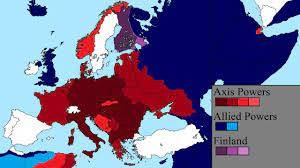
The post-Cold War era, which started optimistically in the 1990s with ideas of global peace, is now concluding, three decades later, with the rise in global war risks. The rise of nationalist and authoritarian regimes, territorial disputes, and economic strains are some of the striking similarities between the pre-World War II era and the present day.
Europe is involved in its worst military conflict in generations, and Israel and Hamas are making things worse in the Middle East, which adds to the turmoil. The world seems to be on the brink of being overwhelmed by interconnected conflicts, as it was right before the last global war.
It is, therefore, essential to consider the historical context, which comprises political and economic factors that led to the emergence of tensions in the pre-World War II period. The existing regional conflicts are multilateral and many‐faced, touching on various issues, including territorial issues, resource allocation, and ideological differences. These conflicts have incredibly dire consequences that threaten the existing world.
Historically, World War II also began as three regional crises: The Japanese invasion of Manchuria in 1931, the Italian ambition for a colonial empire in Africa, and the German bid for a dominant position in Europe in the 1930s and 1940s were all rooted in the need for power, resources, and territorial expansion. Japan aimed to obtain resources and expand its empire, while Italy tried to revive its former glory as a colonial power. Germany’s bid on Europe aimed at territorial expansion, racial supremacy, and economic supremacy.
Additionally, the striking parallels between the suffering inflicted on Jews by Nazi Germany during the Holocaust and the ongoing catastrophic conditions that Israel is forcing on Palestinians in besieged Gaza today. These historical events maintain the link to the current wars since the need for power, resources, and territorial expansion is still the main cause of conflicts. The conflicts in the Middle East and North Africa, currently ongoing, are fuelled by the pursuit of power and resources and religious and ideological differences. Likewise, the South China Sea territorial disputes are motivated by the search for resources, territorial expansion, and strategic dominance.
Today, the international system confronts comparable regional issues. Regional conflicts have increased in the past few years, with several major conflicts dominating the headlines. The war in Ukraine, the Israel-Palestine dispute, and the South China Sea tensions are among them. Despite the apparent disconnection of these conflicts, they cannot be regarded as independent, and the possibility that they will combine into a worldwide conflict must be taken into consideration.
World War II witnessed authoritarian regimes such as Nazi Germany and Imperial Japan form the Axis alliance. In the present highly networked world, the Russia-Ukraine conflict repeats a pattern of history, making the economy suffer from rising commodity prices, disrupted supply chains, and potential financial fragmentation. European states are heavily dependant on trade with Russia. They are particularly vulnerable, with neighbouring regions like the Caucasus and Central Asia feeling the effects as they have close links with Russia.
The existing regional conflicts are multilateral and many‐faced, touching on various issues, including territorial issues, resource allocation and ideological differences.
The Middle East, North Africa, Sub-Saharan Africa, and the Western Hemisphere face the difficulties of higher food and energy prices, stricter global financial conditions, and the possibility of social unrest. The conflict illustrates the significance of developing wide social safety nets and regional agreements to support economies to bear shocks.
Revisionist powers, in the past and the present, are encouraged by their elevating capabilities and present grievances, and they aim to change the order of the world to their advantage.
During the interwar period, Germany and the Soviet Union were the most aggressive nations, a mixture of ideological passion, territorial ambitions, and historical grievances acted as the fuel. Currently, revisionist states like Russia, Iran, and North Korea are making their claims, forming partnerships and alliances, and attempting to change the existing order.
The UN, established after WWII to prevent another global conflict, is one of the most prominent organisations in the international community. On the other hand, though the UN may succeed in averting some disputes and crises, it did not manage to prevent all of them in the world. So, it is crucial for all countries, including the P5, to take preventive activities concerning local crises for world stability.
Today, the similarity between the regional disputes and tensions and those that precipitated the Second World War is something to worry about. The past lessons taught us that diplomacy, cooperation, and international law are important tools to help prevent conflicts and build peace and stability.
To address today's issues, climate change, cybersecurity, and terrorism, we need collective action and cooperation instead of unilateralism and aggression. Nations must uphold the principles of international law and respect the sovereignty and territorial integrity of other states. The history lessons ought to teach us the catastrophic outcome of failing to contain regional conflicts which can finally lead to a global war, and therefore provide a clear warning about the necessity for proactive and cooperative measures to keep global peace and security.

